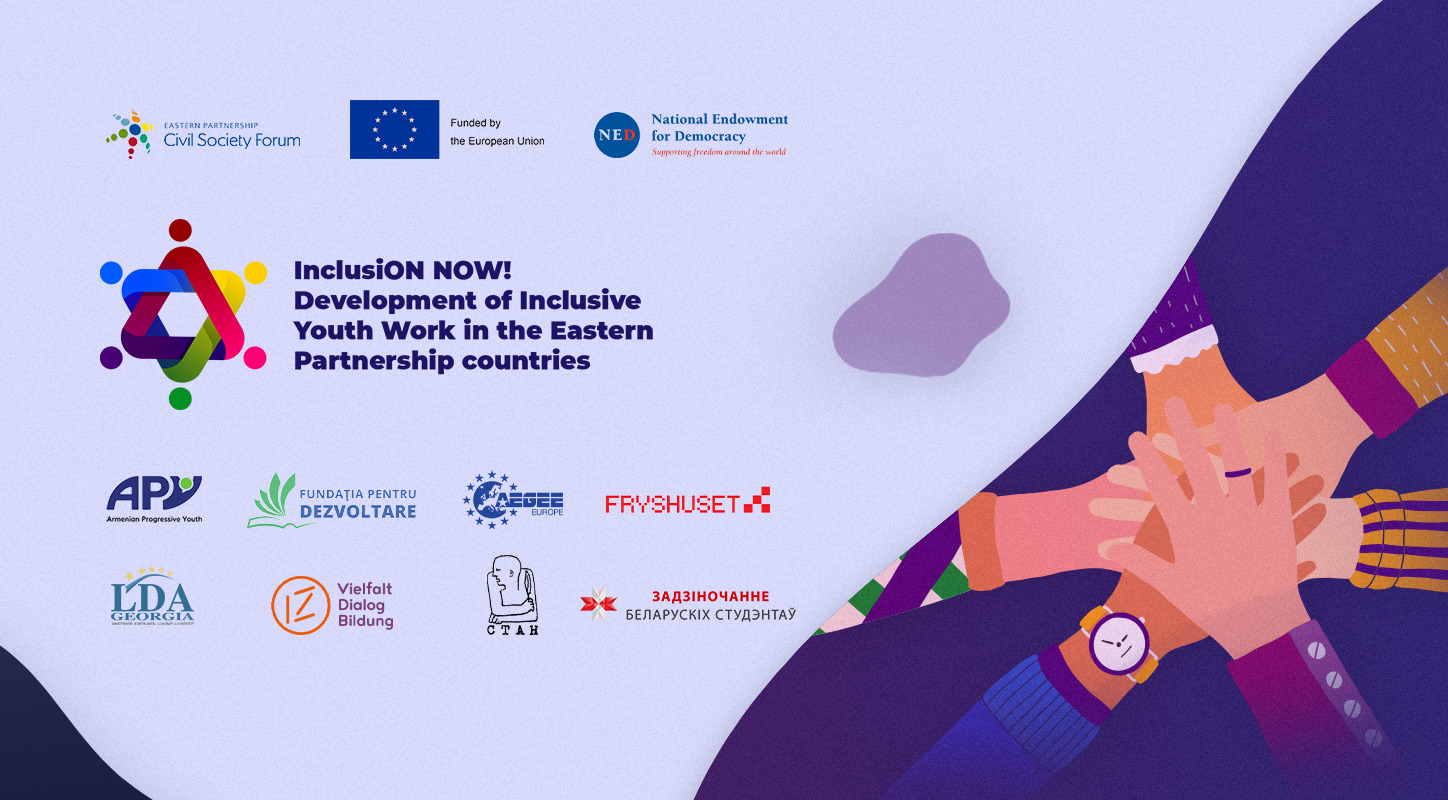
Call for Participants! InclusiON NOW! Online Training for Youth Workers and Youth Educators in the Eastern Partnership countries
- Posted In :
- 0 : comment
Are you a Youth Worker based in one of the Eastern Partnership Countries? Are you interested in acquiring practical youth inclusion tools and methods to use in your everyday work with young people? Would you like to improve the inclusiveness of your organization?
If so, this Online Training is for you!
In December 2020, a group 30 youth workers from 6 Eastern Partnership countries will undergo 25 hours of an intensive Online Course:
– exploring how to outreach and involve young people more effectively;
– learning how to deal with multiple factors of exclusion;
– developing strategies for more inclusivity of youth organizations;
– acquiring new tools and methods of youth inclusion.
Twice a week, the participants will meet experts, youth work practitioners, professional inclusion trainers to:
– share experiences and challenges of youth inclusion in the Eastern Partnership countries;
– learn best practices of increasing inclusiveness of youth work provided to the disadvantaged young people;
– network and develop partnerships.
The Online Course will focus on hands-on approach and practical strategies for achieving inclusive youth work in youth organizations in the Eastern Partnership countries.
The following topics are expected to be covered within the Online Training:
By the end of the session the participants will be able to:
- form a basic understanding of the core terminology of inclusion and diversity;
- define what privilege is and how it impacts the marginalized groups;
- discuss the triangle of violence and its impact on marginalization of vulnerable social groups.
By the end of the session the participants will be able to:
- distinguish various social identity categories and their implications for the marginalized and dominant social groups;
- explain social privilege and marginalization in a general context as well as its implications on the dominant and marginalized groups’ behavioral patterns;
- differentiate and discuss types of power.
By the end of the session the participants will become:
- aware of their own diversity;
- aware of prejudices specific groups face;
- aware of similarities/differences in the group;
- aware of the groups they belong to / are perceived to belong to;
- aware of diversity and types of discrimination.
By the end of the session the participants will be able to understand:
- their selective perception;
- the effects of stereotyping and labelling.
By the end of the session the participants will learn:
- about their own prejudices;
- hot to reflect on their own communication;
- tips for a constructive communicative response to prejudices.
By the end of the session the participants have:
- a basic understanding of the core terminology of youth participation, methods for youth involvement and overall idea of the Theory of Change;
- a wider understanding on how theory can help conceptualizing youth involvement strategies;
- an idea of what the benefits of involving young people in change processes can be.
By the end of the session the participants will have:
- gained knowledge on working methods and practical tools on how to support the transition of youth into inclusion;
- increased awareness on the topic.
By the end of the session the participants will:
- have a basic understanding of the core terminology of exclusion, segregation, integration and inclusion;
- have gained a wider knowledge and understanding of inclusion in their own contexts.
By the end of the session participants will have basic knowledge:
- about community mapping as a starting point of strategic planning and audience development strategy;
- participants will be able to identify vulnerable social and national groups;
- develop a draft of a community mapping plan.
By the end of the session participants will have basic knowledge:
- on strategic planning;
- community life, rights and responsibilities.
- participants will be able to practice skills to discuss openly, work in a team and to have vision;
- promote curiosity and belief that the future is in the hands of every young person and that what they do matters.
By the end of the session participants will have basic knowledge:
- on project circle and realize the connection between activities and overall objective;
- on logical framework matrix verification;
- participants will be able to resume their work during the workshop and to prepare a plan for their future activities.
Duration: December 2nd – 23rd, 2020
Where: Zoom platform (Online)
HOW TO APPLY?
Please submit the Application Form. The deadline for applications is the 29th of November, 23:59 EET (Eastern European Time), 2020.
The selection results will be communicated on the 30th of November, 2020.
The project is implemented by the Armenian Progressive Youth NGO (Armenia) in cooperation with the Belarusian students’ association (Belarus), the Local Democracy Agency (Georgia), the Foundation for Advancement (Moldova), the Youth organization “STAN” (Ukraine), IZ – Association for the Promotion of Diversity, Dialogue and Education (Austria), AEGEE-Europe (Belgium) and Fryshuset Foundation (Sweden).
The project benefits from support through the Eastern Partnership Civil Society Forum Re-granting Scheme (FSTP) and is funded by the European Union as part of its support to civil society in the region.

Apy
November 19th, 2020 View Profile